 About GamePeople
About GamePeople
Subscribe to the Movie Gamer column:![]() RSS or
RSS or
![]() Newsletter.
Newsletter.
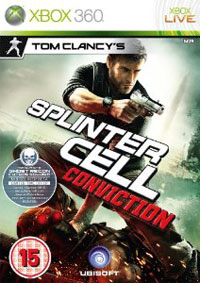
Format:
360
Genre:
Shooting
Style:
Thirdperson
Singleplayer
Cooperative
Buy/Support:
Support Tom, click to buy via us...
Other GamePeople columnists have reviewed this from their perspective - huh?:
Soulful Gamer (360)
Perpetual Gamer (360)
Frugal Gamer (360)
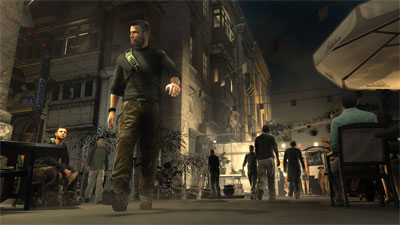
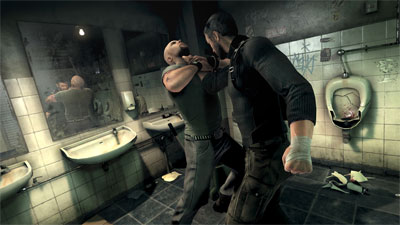
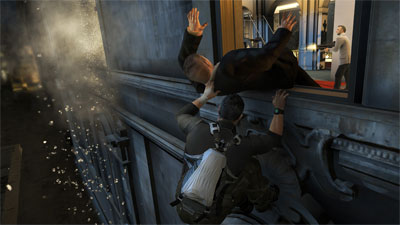
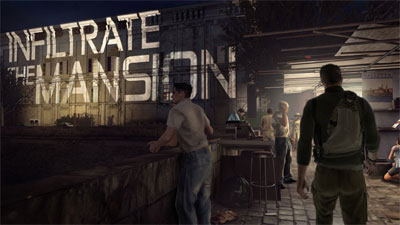

Splinter Cell: Conviction succeeds in making stealth games accessible, but loses something along the way. It apes Bond movies which themselves (more recently) reflect the Bourne franchise. While this grittier, more personal territory results in an intense singleplayer experience, the level of violence is troubling and often derivative.
Sam Fisher is Splinter Cell's long time protagonist, working as a field agent for Third Echelon, a black-ops division of the NSA. While previous games focused on generic Tom Clancy plotlines, Conviction immediately follows the previous game, Double Agent, and draws a retired Sam Fisher back into the world of espionage in order to avenge the death of his daughter.
I recognised this more personal motivation from movies such as Bond and Bourne. I don't think it's a coincidence that spy thrillers became more character oriented as TV shows such as Alias and 24 gained popularity and, therefore, bigger budgets. With TV able to combine grand action with the time to really develop characters, movies had to catch up.
Of course, movies simply aren't long enough for extended personality complexities, but a genuine effort has been made to make storylines more personal. Both James Bond and Jason Bourne have had something personal taken from them, and their searches for revenge and the truth respectively underscore their recent outings. Sam Fisher's motivations in Splinter Cell: Conviction are very similar.
I found these sequences uncomfortable. I was being implicated in the torture.
Since Splinter Cell: Conviction is an espionage thriller, there's more than one plot twist along the way. A simple quest for revenge turns into a hunt for a mole, double crosses and a meditation on the necessity of intelligence agencies. The game strongly argues in favour of intelligence gathering, even going so far as to condone torture.
Conviction is a violent game. Once targets have been tracked down, you're given the chance to interrogate them for information. I found these sequences uncomfortable: I was prompted to 'press B to interrogate,' but not given an alternative. Sam uses anything in the environment to loosen his quarry's tongue: tables, cars, even television sets. I was given the option to walk around and try out the different possibilities.
I was being implicated in the torture by having to press the button, rather than watching it happen in a cut scene. It's a strange inclusion, one that doesn't really seem to serve a purpose. Further, I found the stylish camera angles and slow-motion in these moments of violence incredibly off putting: these are techniques used to show something off. I had to wonder if the game was actually promoting torture.
Aside from the slightly troubling approach to violence, I thought the game looked and played well. The shaky-cam visuals and grungy colours matched the gritty style appropriately, though I found it a little cliched. Moving and shooting is much easier than in previous Splinter Cell games, though stealth fans may find this a problem.
It deals with violence in a thoughtless way that seems to condone torture in the pursuit of intelligence.
Between the improved controls and Mark and Execute feature, enemies are just too easy to kill. The idea of a stealth game is to avoid enemies: Conviction is too lenient about being discovered. Admittedly this makes it more accessible: I've never been good at stealth games, as I don't have the patience, and this accessibility meant I got along with the game much better than previous entries.
Far more challenging, however, was the co-operative campaign. Acting as a prelude to the main game, two players can take on four missions together. These missions are far harder than the campaign, often requiring a restart if you're discovered. There are still some action scenes, but long stealth sections with few checkpoints meant myself and my brother we're frequently replaying areas, using a trial and error approach. It was infinitely more satisfying than the singleplayer experience.
Splinter Cell: Conviction is a highly polished game that makes stealth games more accessible for newcomers, while allowing stealth fans their fun in the co-op missions. The campaign borrows heavily from the Bourne and Bond movie franchises, but deals with violence in a thoughtless way that seems to condone torture in the pursuit of intelligence. It's incredibly relevant, but only one side of the argument is given consideration.



Tom Dann writes the Movie Gamer column.
"As a student of Film and a fan of technology, I love the intersection of art and tech. I'm fascinated by the latest advances and what they're capable of: new ways to interact with games, new graphics to make the experience as immersive as possible, or simply the culmination of existing techniques."
Here are the games I've been playing recently:
© GamePeople 2006-13 | Contact | Huh?

|
Family Video Game Age Ratings | Home | About | Radio shows | Columnists | Competitions | Contact
With so many different perspectives it can be hard to know where to start - a little like walking into a crowded pub. Sorry about that. But so far we've not found a way to streamline our review output - there's basically too much of it. So, rather than dilute things for newcomers we have decided to live with the hubbub while helping new readers find the columnists they will enjoy. |
Our columnists each focus on a particular perspective and fall into one of the following types of gamers:
|